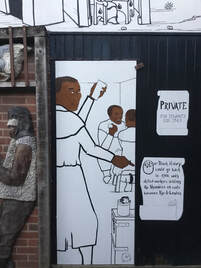 Chilling in the Shambles by Melissa Hill
Chilling in the Shambles by Melissa Hill The day will start with a panel looking at Education and Public Engagement from a wide variety of angles. First Yvonne Sinclair, a former Head of History, who now lectures trainee teachers, will give us an insight into her current PhD research comparing how enslavement is taught in both England and Jamaica. Then we'll hear from Carina Ancell and Alan Kunna about how they have explored the topic at Newham Sixth Form College in East London with their students using the Hutchison Family of the Gold Coast and Britain as a case study.
Education doesn't end when we leave school of course so the next two presentations will look at engaging museum and local community audiences with Black British History. Susanna Jorek will talk about Processes of Decolonization in Museums in Germany and the UK, with a particular focus on Bristol Museums; and then we will hear how Tony Kalume of Diversity Lewes has been Celebrating African Caribbeans in Sussex Past And Present.
After lunch Gretchen Gerzina, author of Black London and presenter of BBC Radio 4 documentary Britain's Black Past will tell us about her new edited collection of essays also entitled Britain's Black Past, which presents a dazzling range of new research and projects from some of the stars of the field (including our own Michael Ohajuru writing about his John Blanke Project), many of whom have presented at previous WHBBH events. You can feast your eyes on the contents page here.
Next, we'll be hearing about Digital Humanities and Databases. Charles R. Foy will tell us all about his
Black Mariner Database, with a special focus on the over 1,700 British Black mariners included therein, and the 'anxious Atlantic' world they had to navigate (Charles also has a chapter about this in the new book, Britain's Black Past, edited by Gretchen Gerzina). Katy Roscoe will talk about her database of over 2500 prisoners incarcerated on Cockatoo island, Sydney's most notorious 19th century prison, some of whom were of African origin.
Then Daniel Domingues will present his Visualizing Abolition Project, which maps the suppression of the trade in enslaved Africans by tracing nearly 31,000 records of correspondence exchanged between the British Foreign Office and British commissioners, ministers, naval officers, and representatives of foreign governments around the world over the course of the nineteenth century.
The final session will be on the theme of Art and Culture. This September, British-American artist Melissa Hill added an image to an existing mural of 'three regular medieval guys chilling' in The Shambles, at the heart of the medieval town of Sevenoaks, Kent. Motivated by BLM protests in towns across Kent, she wanted to raise the question of how far back one might have found a Black presence in the town. She will reflect on shaking up the imagination of historical possibility in a rural English town. Then Mark McCarthy will explore the depiction of Black Loyalists in Benjamin West’s 'Allegory of Britannia', which in what Simon Schama has called 'an outrageously self-serving fiction', shows a bountiful Britain compensating those who had fought for her during the American War of Independence. Finally Australian art historian Alice Proctor, author of The Whole Picture: The colonial story of the art in our museums & why we need to talk about it, who has been leading Uncomfortable Art Tours of London's leading museums and galleries for several years will talk about Discomfort: Truth and Representation in British Galleries.
Really hope you can join us for what looks to be a really thought provoking and invigorating day. It's FREE to attend and you can find the booking form and full agenda here.
If you can't make it, we'll be live-tweeting @BlackBritHist #WHBBH_TN2 throughout the day, and the recordings will be made available after the event.

 RSS Feed
RSS Feed
